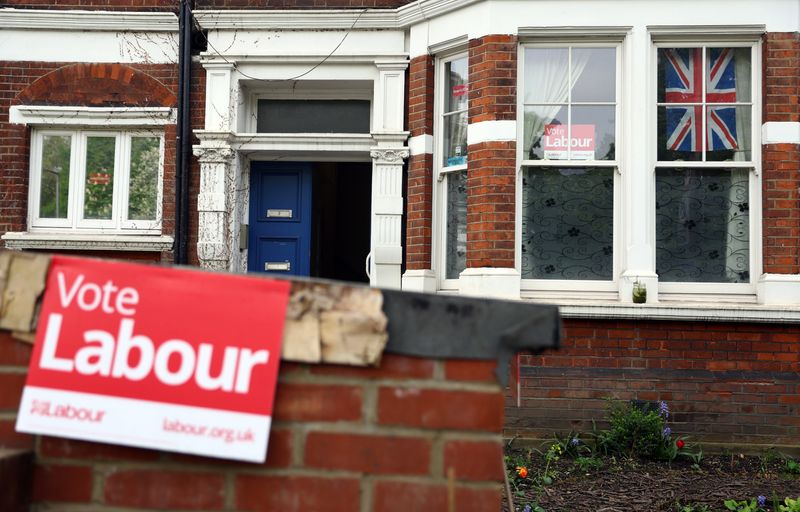
A look at the day ahead in U.S. and global markets from Mike Dolan
While U.S. markets return from the Independence day holiday to assess significant cooling of the labor market stateside, British markets rallied on a long-forecast landslide for the UK’s opposition Labour Party in Thursday’s elections.
The combination is weighing further on the dollar early on Friday, with the index down for the fourth straight day and hitting its lowest in three weeks ahead of the June national employment report. Sterling, close to its best levels since the Brexit vote in 2016 on a trade-weighted basis, hit its highest since June 13 against the dollar.
A litany of soft labor market soundings from Wednesday – weekly jobless claims, layoffs and private sector hiring for last month all missed forecasts and colored in a picture of weakening growth into mid-year. The Atlanta Federal Reserve’s “GDPNow” real time estimate is down to 1.5% and U.S. economic surprises are at their most negative in two years.
U.S. payrolls growth is expected to have slowed to 190,000 in June – down more than 80,000 from May – and annual average earnings growth is expected to have eased to 3.9% from 4.1%.
Although the unemployment rate is expected to hold steady at 4.0%, a tick higher to 4.1% would ring the so-called Sahm Rule – a formula developed by former Fed economist Claudia Sahm that suggests a half point rise in the rolling three month jobless rate average above the low of the prior year flags recession.
Despite ongoing equivocation from Fed officials, markets are back almost fully priced for two rate cuts this year. That now sees an 80% chance of a first move in September, as unlikely as that seems just before divisive U.S. elections.
Ten-year Treasury yields were fraction softer ahead of Friday’s bell, with Wall St futures steady and looking to sustain record highs hit for the main indexes on Wednesday as second-quarter corporate earnings start to stream in next week.
But the pound and UK stocks welcomed the expected landslide for the UK Labour Party, which returns to power after 14 years with what is estimated to be at least a whopping 170 seat majority.
British mid-cap stocks captured by the FTSE 250 index jumped almost 2% early on Friday and the spread on five-year UK gilt yields over German government bonds fell to its lowest in three weeks on hopes that the incoming government will provide a period of economic stability after an often tumultuous period of Conservative Party rule.
British home building firms stood out, with an index tracking their shares up 2.3%..
Unlike France, where Marine Le Pen’s National Rally party made historic gains in an election last Sunday, overall the British public has plumped largely for center or center-left parties.
Countrywide, about 20 million people voted for Labour, Liberal Democrats, Green and Scottish Nationalists as opposed to about 10 million for Conservatives and the far right Reform UK Party.
But French markets have rallied this week too, as tactical positioning and voting ahead of Sunday’s second-round of assembly elections there look to prevent the far right getting an overall majority and pointing to a hung parliament there.
French and euro zone stocks and the euro currency were about 0.5% higher on Friday. The French 10-year government bond premium over Germany’s was at its lowest in three weeks at 66 basis points.
The big other currency mover this week has been Brazil’s real, which strengthened another 1% on Thursday below 5.49 per dollar after Brazilian President Luiz Inacio Lula da Silva ordered his economic team to comply with the country’s fiscal framework and approved suggestions of spending cuts, the country’s finance minister said.
Real weakness this year saw it drop more than 10% to more than two-year lows on concerns about fiscal sustainability in Latin America’s biggest economy.
Lula da Silva said on Tuesday he was worried about the recent weakness of the currency, adding that “something” needed to be done to tackle what he called “speculation”.
Elsewhere, the China stocks finished the week at a 4-1/2-month low, weighed down by financial and consumer shares. China’s mainland index has now wiped out all its gains for the year.
Key developments that should provide more direction to U.S. markets later on Friday:
* US June employment report

* UK election results due
* New York Federal Reserve President John Williams speaks in India; European Central Bank President Christine Lagarde speaks in France
(By Mike Dolan, editing by Tomasz Janowski [email protected])
This post is originally published on INVESTING.




